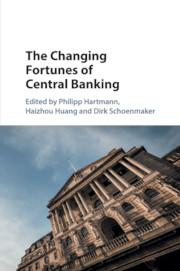Book contents
- The Changing Fortunes of Central Banking
- The Changing Fortunes of Central Banking
- Copyright page
- Contents
- Figures
- Tables
- Contributors
- Acknowledgement
- 1 Introduction and Overview
- Part I Monetary Economics and Policy
- 2 Money
- 3 Monetary Control in the UK
- 4 Pristine and Parsimonious Policy
- 5 Central Bank Talk about Future Monetary Policy
- 6 Bank Capital and Monetary Policy Transmission
- 7 When Are Central Banks More Likely to Target Asset Prices?
- Part II Financial Stability and Regulatory Policy
- Part III Foreign Exchanges and International Architecture
- Part IV The Millennium Challenges of Central Banks
- Index
- References
2 - Money
How Could Economists Do without It?
from Part I - Monetary Economics and Policy
Published online by Cambridge University Press: 29 March 2018
- The Changing Fortunes of Central Banking
- The Changing Fortunes of Central Banking
- Copyright page
- Contents
- Figures
- Tables
- Contributors
- Acknowledgement
- 1 Introduction and Overview
- Part I Monetary Economics and Policy
- 2 Money
- 3 Monetary Control in the UK
- 4 Pristine and Parsimonious Policy
- 5 Central Bank Talk about Future Monetary Policy
- 6 Bank Capital and Monetary Policy Transmission
- 7 When Are Central Banks More Likely to Target Asset Prices?
- Part II Financial Stability and Regulatory Policy
- Part III Foreign Exchanges and International Architecture
- Part IV The Millennium Challenges of Central Banks
- Index
- References
Summary
- Type
- Chapter
- Information
- The Changing Fortunes of Central Banking , pp. 21 - 31Publisher: Cambridge University PressPrint publication year: 2018



